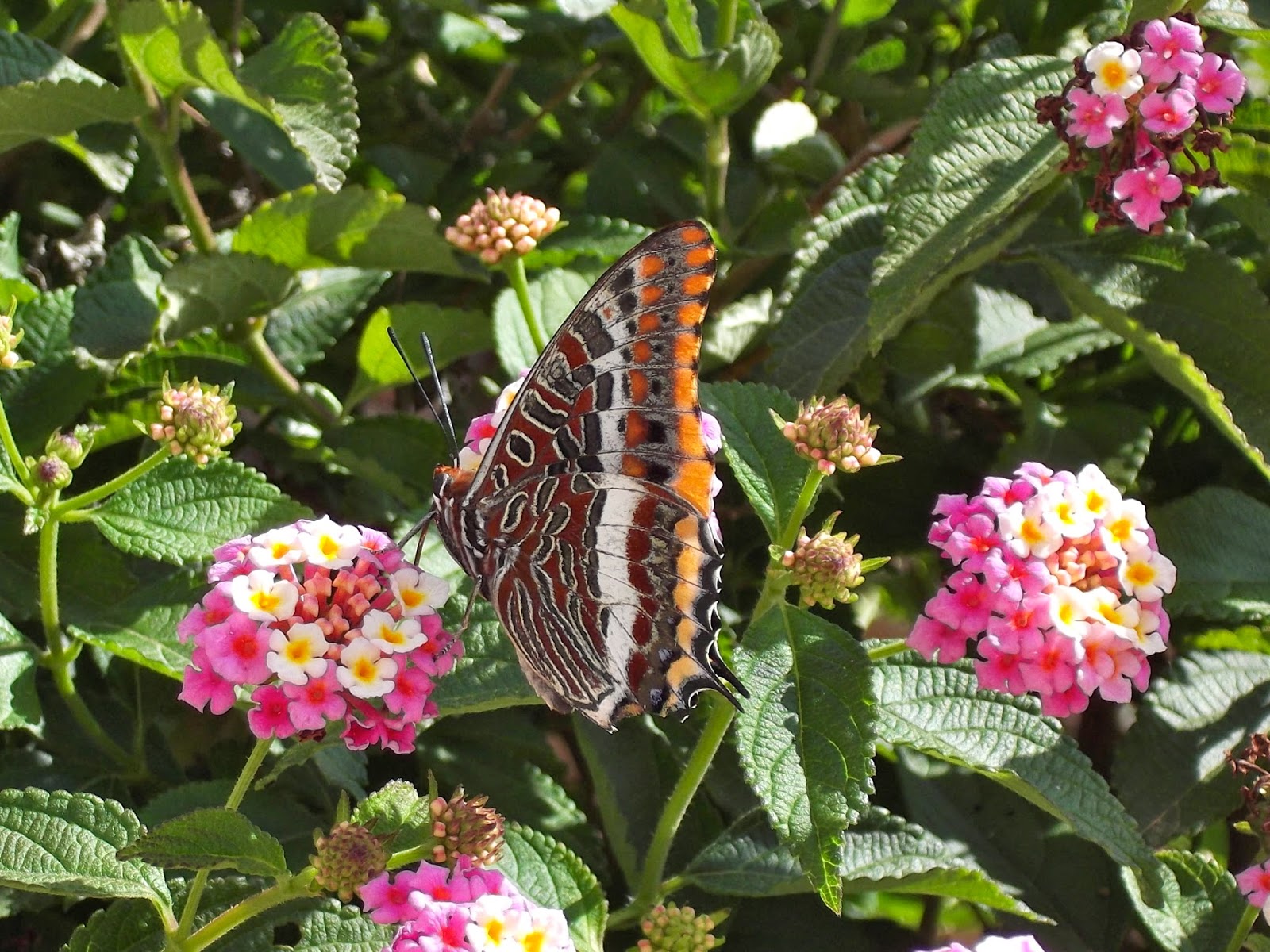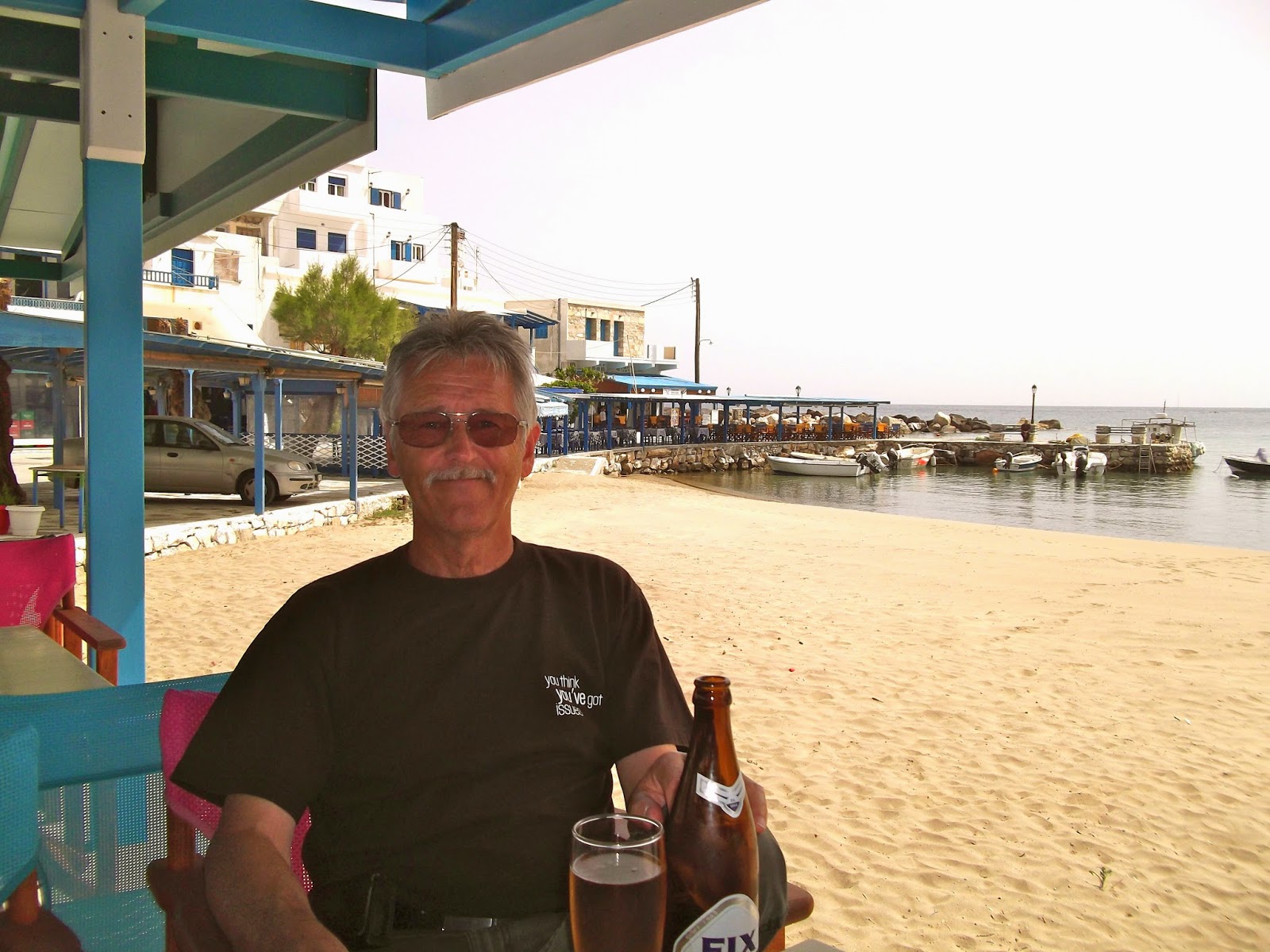The other evening, as we sat on the terrace with a little drinky-poo, our attention was drawn to a bit of a rumpus going on beneath one of the Lantana bushes not more than a few feet from where we sat. There were puffs of dust rising and flashes of bright green could be seen as something was evidently thrashing about down there.
Rushing inside to grab the camera and convincing myself that the show would be over just as soon as I returned with it, I was pleased to see that it was still going on. Sure enough, there were two lizards, each about 9 or 10 inches in length, furiously circling one another in the dust and so preoccupied with their activity that they allowed me to get in quite close to snap these...
"They're fighting" says my dearly beloved.
"They're mating" says I, entirely without knowledge and with loads of bluff.
"They're not. They're fighting. Look, one has the other one by the throat!" Says my dearly beloved.
"Aah, yes, but that's how they mate - these chaps. Well, ...chaps and chap-esses" says I, still hoping I'd be proven right, though fully expecting to be proven wrong.
Guess what, once I'd shot the pics and the two protagonists had finally completed the show and sloped off in separate directions, I whipped out the old laptop and Googled "mating rituals of lizards" with some trepidation, I must admit, about being shot down in flames by the better half.
Boy, was I relieved when I came across this page. If you click that link and scroll down to the subheading "The Mating Ritual" you'll see a description of precisely what we'd watched. Boy was I a happy bunny. I resisted the urge to pretend all along that I'd known all this stuff though, but only just.
"But why does the male bite the female on the neck?" asked my significant other.
"You've got a short memory," I replied, ever so slightly smirking.
•
On Tuesday evening we went out for a stroll down to the beach road, it was so beautiful outside that it would have been a crime to stay indoors and watch Ακου τι Είπαν on Alpha TV. So off we trotted down the lane and eventually on to the sleepy beach road that so many visitors to Kiotari still fail to find.
After a while we approached the spot we love, where you'll find the Il Porto café, plus a few tavernas, namely The Pelican's Nest, Stefano's and La Strada. Just a little further along too is the Paralia, right on the beach. Hailing Tassos and Anastacia as we passed the Il Porto, we stopped to admire the now completely renovated terrace that George has worked so hard to prepare in the Pelican's Nest. As we stood there admiring various aspects that pleased us, a head appeared over the white bannister, the one belonging (the head that is ...well, the bannister too come to think of it) to George the owner himself.
"Yassas Pedia!" he called, as he placed a half-consumed frappé down on the table top beside the head in question, which - as we've established - was his. We returned the greeting and gushed our praise over the sterling work he'd done to completely overhaul the feel of the place. After a few moments during which he graciously accepted our praise, he suggested we might like to stop for a drink, if we weren't in a hurry that was.
Since we had all evening and it was deliciously wind-less and warm, we almost accepted, until, patting my pockets, I exclaimed that we didn't have a bean with us.
"Ah, thing is, got nothing on us George," I said. To which George replied:
"Listen guys. I invited you didn't I? Get yourselves up here and pass a few moments with me!"
No contest then. Up the newly installed steps we ascended to catch our first glimpse from inside of just how nice he's made the place during months of hard graft all winter...
My beloved asked for a simple bottle of still water and I requested a frappé for myself. Bit risky ordering coffee in the evening, but now and then you have to live dangerously, eh?
Soon we were joined by another local, Vasilis, someone we've known almost since moving out here in 2005 and the conversation flowed animatedly for half an hour or so. Then came time for us to be on our way, for the twenty-minute or so walk back up to the house.
We thanked our host profusely and promised that when my sister and her hubby are here with us in July we'll bring them to George's place to eat at least once, then bade goodnight to Vasili and strolled off into the gloaming.
As we were descending the steps, George's first customers of the evening came in. Timing eh?
When we got home we both agreed that we'd had one of those moments that you get occasionally; the ones that remind you that life can be very sweet just now and then.
"Sweetie," I said, as we locked the garden gate behind us, "You know what those lizards do when they mate..."
The look she gave me left me in no doubt that this was an avenue I'd best not pursue on this particular occasion.
















































